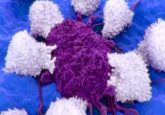Research reveals how nutlins work to halt cancer growth

Researchers from the Walter and Eliza Hall Institute (Australia) have discovered the mechanisms by which nutlins – a novel class of anticancer drug – work. The study, which was published recently in the journal Cell Reports, could help tailor cancer treatment in the future.
Nutlins first sparked interest among the global medical community due to their ability to activate the p53 gene, thereby halting cancer growth without the damaging effects of chemotherapy. Although currently in early clinical trials for blood cancers the mystery of whether nutlins effectively kill tumor cells, or simply temporarily suppress them, has remained unsolved.
“When functioning properly, p53 is activated in response to early cancerous changes in the cell. p53 acts by either halting the cell while repairs are made or by forcing the cell to die if it cannot be repaired,” explained Andreas Strasser (Walter and Eliza Hall Institute). “Without the ‘help’ of p53, a damaged cell can be allowed to multiply, leading to cancer development. p53 lies dormant in many types of cancer – that do not have mutations in p53 – and the nutlins work through re-awakening its activity.”
The Australian research team identified the presence of the PUMA protein, proving that nutlins activate p53 and trigger apoptosis in blood cancer cells.
“Our findings will help identify which patients are most likely to benefit from nutlins and which types of cancers are most likely to respond to nutlins as a treatment,” Brandon Aubrey (Walter and Eliza Hall Institute) commented. “Understanding in detail how the drugs work will help in the design of better clinical trials and bring the world closer to more precise and personalized medical treatments for cancer.”
“By understanding how nutlins are killing cancer cells, we can begin to formulate their best possible use, including choosing the best partner drugs to combine the nutlins with,” Strasser concluded.




